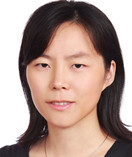WANG FengyanPhysical Chemistry, Professor
Email:fengyanwang@fudan.edu.cn
Office Location: Room A3001, Chemistry Building, Department of Chemistry, Fudan University 2005 Songhu Road, Yangpu District, Shanghai 200438, China
Tel: 86-21-31249129
Website (Research Group URL):http://homepage.fudan.edu.cn/fengyan
Research Interests
Academic Appointments
Prizes and awards
Biography
Teaching
Key Publications
Chemical reactivity of vibrationally or electronically excited molecules
Steric control of bimolecular reactions
Electron transfer dynamics in transition metal chemistry
2013, the National Science Fund for Excellent Young Scholars
2012, Shanghai Eastern Scholar award
2011, IAMS Annual Award for Outstanding Publication by a Junior Researcher
2006, European Union Marie Curie fellowship
1998.9-2002.7 Shandong Normal University, B.S. degree
2002.9-2009.7 Dalian Institute of Chemical Physics, Chinese Academy of Sciences, Ph. D. degree
2006.10-2008.10 Institute of Electronic Structure and Laser, Foundation for Research and Technology, Heraklion;
2008.4-2008.5 the European Laboratory for Non-linear Spectroscopy, Florence;
2008.6-2008.7 Vrije Universiteit, Amsterdam, Ph.D Studies (supported by Marie Curie fellowship).
2009.8-2013.1 Institute of Atomic and Molecular Sciences, Academia Sinica, Postdoc.
2013.1- Department of Chemistry, Fudan University
Physical chemistry (dynamics)
Wang, Fengyan, Lin, Jui-San, Liu, Kopin. How to measure a complete set of polarization- dependent differential cross sections in a scattering experiment with aligned reagents? J. Chem.Phys., 140, 084202 (2014).
Liu, R. Wang, F. Jiang, B. Czako, G. Yang, M. Liu, K. Guo, H. Rotational mode specificity in the Cl + CHD3 --> HCl + CD3 reaction. J. Chem.Phys., 141, 074310 (2014).
Fengyan Wang, Jui-san Lin, Yuan Cheng, Kopin Liu, Vibrational enhancement factor of the Cl+CHD3 (ν1=1) reaction: rotational-probe effects, J.Phys.Chem. Lett, 4,323 (2013).
Fengyan Wang, Kopin Liu, Imaging the effects of bend-excitation in the F + CD4 (vb=0, 1) DF(v)+CD3(v2=1, 2) reactions, J.Phys.Chem. A, 117, 8536 (2013).
Wang, F., Lipciuc, M. L.Kartakoullis, A.Glodic, P., Samartzis, P. C.,Yang, X., Kitsopoulos, T. N., Slice imaging of methyl bromide photofragmentation at 193 nm, Phys.Chem.Chem.Phys., 16, 599 (2013).
Fengyan Wang, Kopin Liu, Steric Effects in the Cl+CHD3(v1=1) Reaction, Chi.J. Chem.Phys., 26, 705 (2013).
Fengyan Wang, Kopin Liu, T.Peter.Rakitzis, Revealing the stereospecific chemistry of the reaction of Cl with aligned CHD3(v1=1), Nature Chemistry, 4, 636 (2012). Featured in Science’s Editor’s choice(Science: 337, 778).
Fengyan Wang, Jui-San Lin, Kopin Liu, Steric control of the reaction of CH stretch-excited CHD3 with chlorine atom, Science, 331, 900 (2011).
Fengyan Wang, Kopin Liu, Experimental signatures for a resonance-mediated reaction of bend-excited CD4 (νb=1) with fluorine atom, J.Phys.Chem. Lett, 2,1421 (2011).
Fengyan Wang, Kopin Liu, Enlarging the reactive cone of acceptance by exciting the C–H bond in the O(3P) + CHD3 reaction, Chemical Science, 1,126 (2010).
- Links:
- Fudan University|
- ALUMNI|
- LIBRARY|
Address: Chemistry Building, Department of Chemistry, Fudan University
2005 Songhu Road, Yangpu District, Shanghai 200438, China Tel: 86-21-31242791
Copyright © Department of chemistry, Fudan University 2014 Support:WeiCheng

